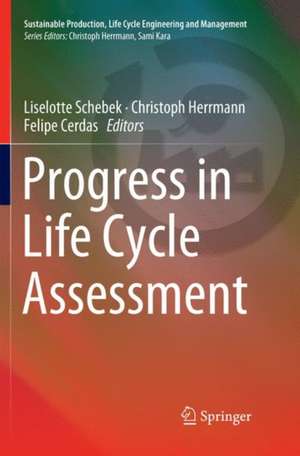Progress in Life Cycle Assessment: Sustainable Production, Life Cycle Engineering and Management
Editat de Liselotte Schebek, Christoph Herrmann, Felipe Cerdasen Limba Engleză Paperback – 3 ian 2019
| Toate formatele și edițiile | Preț | Express |
|---|---|---|
| Paperback (1) | 635.01 lei 6-8 săpt. | |
| Springer International Publishing – 3 ian 2019 | 635.01 lei 6-8 săpt. | |
| Hardback (1) | 641.03 lei 6-8 săpt. | |
| Springer International Publishing – 4 oct 2018 | 641.03 lei 6-8 săpt. |
Din seria Sustainable Production, Life Cycle Engineering and Management
- 20%
 Preț: 548.77 lei
Preț: 548.77 lei -
 Preț: 428.68 lei
Preț: 428.68 lei - 18%
 Preț: 891.48 lei
Preț: 891.48 lei - 18%
 Preț: 885.95 lei
Preț: 885.95 lei -
 Preț: 355.31 lei
Preț: 355.31 lei - 15%
 Preț: 645.47 lei
Preț: 645.47 lei - 15%
 Preț: 636.30 lei
Preț: 636.30 lei - 15%
 Preț: 644.63 lei
Preț: 644.63 lei - 18%
 Preț: 1107.73 lei
Preț: 1107.73 lei - 15%
 Preț: 661.65 lei
Preț: 661.65 lei - 15%
 Preț: 641.53 lei
Preț: 641.53 lei - 18%
 Preț: 938.83 lei
Preț: 938.83 lei - 15%
 Preț: 647.73 lei
Preț: 647.73 lei - 18%
 Preț: 938.51 lei
Preț: 938.51 lei - 15%
 Preț: 641.03 lei
Preț: 641.03 lei - 18%
 Preț: 775.96 lei
Preț: 775.96 lei - 15%
 Preț: 636.80 lei
Preț: 636.80 lei - 15%
 Preț: 642.51 lei
Preț: 642.51 lei - 18%
 Preț: 1224.18 lei
Preț: 1224.18 lei - 15%
 Preț: 640.71 lei
Preț: 640.71 lei - 18%
 Preț: 894.16 lei
Preț: 894.16 lei - 15%
 Preț: 596.04 lei
Preț: 596.04 lei - 15%
 Preț: 641.71 lei
Preț: 641.71 lei - 15%
 Preț: 645.28 lei
Preț: 645.28 lei - 18%
 Preț: 950.66 lei
Preț: 950.66 lei - 18%
 Preț: 778.94 lei
Preț: 778.94 lei - 15%
 Preț: 642.36 lei
Preț: 642.36 lei - 15%
 Preț: 639.25 lei
Preț: 639.25 lei - 15%
 Preț: 638.43 lei
Preț: 638.43 lei
Preț: 635.01 lei
Preț vechi: 747.06 lei
-15% Nou
Puncte Express: 953
Preț estimativ în valută:
121.55€ • 132.07$ • 102.17£
121.55€ • 132.07$ • 102.17£
Carte tipărită la comandă
Livrare economică 21 aprilie-05 mai
Preluare comenzi: 021 569.72.76
Specificații
ISBN-13: 9783030063900
ISBN-10: 3030063909
Pagini: 175
Ilustrații: VIII, 175 p. 62 illus., 21 illus. in color.
Dimensiuni: 155 x 235 mm
Greutate: 0.27 kg
Ediția:Softcover reprint of the original 1st ed. 2019
Editura: Springer International Publishing
Colecția Springer
Seria Sustainable Production, Life Cycle Engineering and Management
Locul publicării:Cham, Switzerland
ISBN-10: 3030063909
Pagini: 175
Ilustrații: VIII, 175 p. 62 illus., 21 illus. in color.
Dimensiuni: 155 x 235 mm
Greutate: 0.27 kg
Ediția:Softcover reprint of the original 1st ed. 2019
Editura: Springer International Publishing
Colecția Springer
Seria Sustainable Production, Life Cycle Engineering and Management
Locul publicării:Cham, Switzerland
Cuprins
Preface.- State of the art and future developments in life-cycle assessment (LCA).- Using network analysis for use phase allocations in LCA studies of automation technology components.- Eco-indicators of machining processes.- Enhancing the Water Footprint method to a region specific management tool.- Product system modularization in LCA towards a graph theory based optimization for product design alternative.- Integrating LCA into automotive manufacturing – A review-based framework to measure the ecological performance of production technologies.- Hydrothermal carbonization (HTC) of sewage sludge: GHG emissions of various hydrochar applications.- Uncertainty information in LCI-databases and its propagation through an LCA model.- LCA of energy and material demands in professional data centers: Case study of a server.- Identification of potentials for improvement in paint production process through Material Flow Cost Accounting – a step towards sustainability.- Development ofa functional unit for a product service system: One year of varied use of clothing.- LCA in process development: Case study of the OxFA-process.- Using energy system Modelling Results for Assessing the Emission Effect of Vehicle-to-Grid for Peak Shaving.- Assessment of social impacts along the value chain of automation technology components using the LCWE method.- LCA of industrial cooling towers.- Bioplastics and Circular Economy -performance indicators to identify optimal pathways.- Spatially differentiated sustainability assessment of products.- Life cycle assessment of German energy scenarios
Textul de pe ultima copertă
The book contains the latest developments in the field of life cycle assessment (LCA) and its application. It contains numerous research articles from leading German research institutes working towards the further development of the methodology. The book provides important insights for professionals working in the field of sustainability assessment, for researchers interested in the current state of the research of the methodology and its application as well as for advanced university students in different science and engineering fields.
Caracteristici
Presents latest methodological developments of the LCA methodology Presents advances on the application of the methodology in different application fields Articles from various fields, tables and figures help the reader stay updated about the advanced applications about environmental assessment
